- Home
- Kris Saknussemm
Sea Monkeys Page 2
Sea Monkeys Read online
Page 2
In another photograph taken some years later, she’s standing proudly holding two glistening rainbow trout beside a camper that looks exactly like the full-sized version of the Tonka truck I received for my sixth Christmas. She’s beaming a huge smile and wearing a white cowboy hat just like the one I wore in so many of my childhood pictures, dangling her prize catch from her prosthetic hand.
The picture is a mirror of one of me in Calaveras County one afternoon (the time that Dad and I went to Angels Camp for the Jumping Frog Contest and the Hell’s Angels took over the town). I’m sitting in a meadow outside Arnold, in a straw hat with a blue band, the same blue of that Tonka truck, holding up a trout. I look chubby and flushed. Laid out behind me on a rain slicker are ten smallish brown trout (they’re chumps, really; Dad should’ve made me throw them back).
Holding up fish seems to be a family theme. In one photo with my stepbrother Tip, the eastern brook trout are much larger and I’m thinner, more muscular, a humid mist of rain surrounding us, Tip with no shirt despite the moisture, a mass of blackberry bramble and the rusted remains of cars looming behind us on the river’s edge.
Tip and I once caught the same fish, standing on different sides of a creek running off the Stanislaus River. If you tried to do it, you couldn’t in a million years. We were both hollering, “I got one! I got one!” until we had our lines pulled tight, poles raised and the trout suspended over the water wriggling in the sun. (I later reminded Tip of this incident when he was arrested for grand theft at age eighteen, and he laughed sadly. Following his brain surgery, he said it was one of his childhood memories that remained fixed and bright.)
Then there’s the picture of my father fishing Bow River in Alberta. At first glance he looks like himself. It’s a honeymoon of sorts—with his third wife Milly. Dad stands on the edge of the slate stone bank wearing his waders, blue shirt, fishing net over one shoulder, creel over the other, his handmade fly rod (the mate of mine) extending out of frame.
His body is cut at the waist by the shadow of a concrete bridge that runs like a frame within the frame. The bridge is smooth, sheer and as white as dried bone, suggesting both light and strength—but also an oppressive weight bearing down on the scene like a tombstone. The water beneath it is black, while the section where Dad is standing is perfectly clear, iridescent with current-softened stones. The stark contrast reminds me of an idea that he often spoke of, cited in Jung and credited to Basil the Great, that the darkness, as in the evil and trouble here on earth, is the shadow cast by heaven.
Below the bridge, the dark water once again opens to the light, a rush of whitewater revealing where the break flow of stones has accumulated. The green world begins too, grass and reeds, saplings and taller pines. Behind the massive white border of the bridge, you can’t see any sky, yet the light is intense and whatever shadow Dad casts lies out of frame. I suspect by the fierce quality of the glare that it’s late morning or early afternoon and he doesn’t have much shadow to cast on either grass or water, which with the immediacy of the bridge and the fact that he’s dressed in full fly-casting regalia, tells me that all isn’t entirely well. He wouldn’t be seriously fly-fishing outside of the early morning or dusk, and he wouldn’t have his waders on for fast, shallow water like this. I can see he’s using the darkness of the bridge, letting his line drift down where the fish are more likely to be, but ordinarily he’d have strayed farther from such structures, wanting to fish more remote water, wanting to be more to himself. The sum total is that this picture is suspiciously well planned. He’s posing for Milly, the new wife, the last chance. He can’t straggle upstream the way he used to. And if he could, Milly can’t. (She smokes so much she has to be pushed in a wheelchair whenever they go to the airport, even though she’ll outlive him by more than twenty years.) Just getting down the bank from the road has probably been the cause of some humor or harsh words, or both. Plus, she doesn’t understand fishing. She doesn’t grasp the communion with water and time . . . the merging into the past of other pictures where the moments and memories become a river.
This is how my father wants to be seen—in life. And so, with the right kind of haunted camera, you can see that even then, the part of himself that he most admired and valued is going missing, vanishing just like the river that seems to flow through him into the black rectangle of bridge shadow. Perpetual fisherman. His pole points like a lecturer’s baton to something out of reach, out of frame.
Angelou’s husband Dwayne wears safari suits, speaks Russian and seems to exude firearms, to my mother’s horror. Revolvers, hunting rifles. He quotes Jack London speaking about the cold and the quiet of the Klondike: “You get your perspective; I got mine.” Over chicken Maryland and molded cranberry salad, my mother queries what this perspective entails and for a moment the moustache pontificates. He goes on to take Angelou to the Artic—to Churchill to see the polar bears and Eskimo children tossed in blankets. But their peculiar junket of a marriage comes to an abrupt end when Dwayne disappears. He’s believed to have taken one of his elephant guns (which may be why I can’t picture his head) and gone off to find another perspective. He would’ve happily given me a genuine pig-sticker bayonet from an Enfield rifle if my mother had let him, but I had to settle for a gleaming brass .300 Holland and Holland cartridge, a miniature golden rocket (that was later stolen during a birthday party by either Bill Bippus or Snotty Clark).
I like to think that a Komodo dragon got Dwayne. Or a charging Cape buffalo. He’d have preferred it that way. His disappearance left a hole much bigger than his body. In a world of three-bean salad and The Donna Reed Show, his stories of white slavery and bird-eating spiders had great resonance for me. Angelou soldiered on with admirable dignity and more than a little success with men, including a handsome Dutch carpenter who lived in Oakland and had marks on his arms from a childhood spent in a Nazi concentration camp. Then a car accident near Martinez changed her life forever and almost killed Gaja and Aunt Mabo.
Gaja lived with us. Aunt Mabo lived in a little stucco and terracotta Spanish duplex on Dartmouth Street off San Pablo, the long, blue-collar, fast-food and car-lot clogged artery that runs from the old shipyards and oil refineries of Richmond to the Oakland City Hall. One night a delivery boy (“Don’t cook tonight, call Chicken Delight”) was stabbed outside my aunt’s door by a man in a porkpie hat who in turn was struck and killed by a Checker cab (her neighbor, Mr. Hornady, said the attacker was “high on goofballs after knocking over a greasy spoon”).
I see Aunt Mabo standing with her gentleman-bandit husband at the center of the whole clan on that side of the family. He’s a head taller than everyone else, wearing a tweedy English country squire hunting jacket, with a self-satisfied ambassadorial moustache and an immensely charming but deeply suspicious twinkle in his eye. There’s a pervasive sepia mist about the picture . . . linen, wicker . . . babies in sailor suits. Shadows in a garden one summer long ago.
After his death, Aunt Mabo lived alone in Hartford for another ten years before moving out west to join her sister and to eventually become a second grandmother to me, famous for her white plastic “popcorn” beads that I liked to pull apart, and cinnamon doughnuts that she sliced sidewise and toasted under the griller (the doughnuts were purchased from Ortman’s Bakery on Solano, which had the double advantage of being next door to a pet shop with a boa constrictor in a tank in the window).
It was a disturbing thing to see Gaja and Aunt Mabo after the accident, two old women bruised as if they’d been viciously beaten. But Angelou’s injury was more serious still. She lost her left arm at the elbow. There was just a stump. I can see the color of it now. Dead pink pale hospital flesh. Not baby colored but injury colored—like burned people—like survivors who aren’t sure they’re glad they’ve survived. You notice a person’s gestures more when they no longer have a forearm and hand. Your eyes try to complete the picture. Her nervous system did the same. Phantom limb pain. Negative space.
There was nothing simple a
bout Angelou’s response to her loss—or maybe that’s what got her through. I only know that well before I’d have adjusted to such an obstacle, she was back nursing and exercising. After my mother asked my grandmother to leave and our family started falling apart, Gaja moved to an apartment on Oxford Street, which had a small pool. I can see Angelou plowing relentlessly up and down in that churning green rectangle, the echoing room reeking of chlorine and humidity, her artificial arm waiting on a chair by the door.
Then another picture—of her graduation from the Arthur Murray Dance Studio classes. Soon she’ll go to a dude ranch, where she’ll meet Floyd, a former construction worker who fell fifty feet off a scaffold and lived to tell the tale (again and again and again). He received an injury pension and became a Pentecostal Christian. Together they’d marry and move through years and pictures . . . from a duck farm in Solvang to a cottage in Ukiah to a camper out in the Mojave Desert (connected with a community with a religious fixation on the Palomar Observatory) . . . finally to a cabin in Bellows Falls, Vermont (during which time they won the New Hampshire state lottery and invested in a fully fitted-out Gospel Teen touring bus and led a group of young Christian singers around America to raise money for Oral Roberts University in Tulsa, two years after Roberts claimed he could raise the dead). I think of the picture of Angelou proudly waving her prosthetic limb from the Prayer Tower.
Located in the center of the campus to symbolize that prayer is of uttermost importance, the 200-foot Prayer Tower serves as the visitor center. The outward thrust of the observation deck represents the crown of thorns worn by Jesus Christ on the cross, and the red color represents the blood that was shed at His death. Atop the Tower, the eternal flame represents the baptism of the Holy Spirit. On the ground level visitors can view the Journey into Faith or browse in the gift shop.
No, there was nothing simple about her life. Always giving money and time and love to those she thought needed it. Floyd moved on to the great Mobile Home Park in the Sky and she moved back to a mobile home park in Redding, donating her time and money to her church and Sunday school and the local senior’s center before succumbing to bowel cancer.
I confess I was always deeply irritated or amused by her, but when I think back on her life, I can’t help but be impressed by her simple courage, if simple it was. No matter what her limitations, she was utterly sure that she was a daughter of God. There was certainly some presence looking out for her, watching over her life. I go back to the picture of her and Dad and my grandparents on the bench beneath the maple—the unknown boy stopped in the shade, looking on. He’s still standing motionless in the shadow of the tree but I see him differently in this light. Before, he’s always seemed vaguely sinister, a foreshadowing of the problems to come. Now I begin to wonder if this mysterious observer wasn’t/isn’t more a beneficent, protective presence. And I notice that perfectly balancing the figure in waiting in the shadows on the viewer’s left is an orchardist’s ladder on the right-hand side—a ladder that looks archetypally white compared with the receding blackness of the maple.
As I stare at the family flanked by shadow and ladder now, it suddenly occurs to me that Angelou is old enough and pretty enough in a bashful sort of way to be the source of this boy’s attention. Perhaps he’s not a friend of my father’s so much as a friend of hers. Maybe the lip-biting shyness in her smile is a sign of a secret after all. There were always men in her life . . . and adventures . . . and miracles of sorts. I’m tempted to say, what explanation could be simpler? But I know to beware of anything that seems simple. There’s always something that lies just out of frame.
SUNDAY ROAST
It irks me how my aunt tries to hack at her roast beef with her prosthetic arm. I hate the way it clunks on the table and makes the yellow Jell-O salmon quiver.
I wish my father would slice up the meat for her, but my sister and I have been told it’s important that she does it for herself, even if she does clump and make the table shake.
At least the gelatin fish won’t need a knife. It looks like it could tremble apart if I stared at it hard enough.
But the sickly yellow of the wobbling sugar crystal, my aunt’s peach polyester dress, the brown of the gravy and the candy-corn orange of the boiled dead carrots can’t be the colors of any Sunday dinner that would make you hungry.
My aunt uses her moving hand to wipe some gravy from her pale pink plastic one.
“Open your eyes,” my mother says to me. “We’ve already said grace.”
Then she takes a dull silver wedding spoon and scoops off the head of the glistening lemon-flavored salmon.
Or maybe it’s a carp. A big yellow goldfish that can’t hold still long enough even to disappear.
BLUE TO LIFE
I could tell you about my vague recollection of shaking hands with Martin Luther King . . . the sweltering summer of the 1967 riots in Detroit . . . my father preaching in a dead-cat-and-abandoned-needle parking lot . . . our windshield shattered with a brick . . . my mother screaming, “Why did you bring us here?”
It actually wasn’t that much different than what was happening in Berkeley, tear gas drifting down the street . . . the National Guard deployed in force on the campus of the university . . . and across the bay at San Francisco State. Sit-ins, love-ins . . . strange ceremonies and costumes that seemed as if a book of fairy tales had exploded . . . enchantment turned to madness . . . the wonder of PF Flyers (the shoes that make you jump higher and run faster) and Jonny Quest decoder rings gone to the sudden seed of windblown fear and psychedelic desperation . . . the normalcy of Swanson TV dinners, with turkey and gravy and cranberry cobbler, becomes head wounds, gunshots, water cannons, flags and fire.
But the mind, like my family, clings to innocence, even in the face of whirlwinds. Especially in the face of whirlwinds. Cyclones of mirrors.
I’ll tell you about my earliest remembered dream instead. I’m alone in bed and seemingly fast asleep when I feel myself called to. Something or someone is in the room. It’s been there for a while. Watching me. Calling me with its silence. Gradually it’s made me aware of itself—as if turning up the volume on its presence until I can no longer resist. Facing the wall, I have to slowly wake, swimming to the surface from a great depth.
I’m filled with an unspeakable wonder and dread. When at last I turn, for it seems to take the whole of my remembered life or no time at all—I find myself looking into the eyes of a Face staring at me out of a fine mist filling the room—the same unearthly blue as the picture of Jesus my grandfather painted, which hangs in the hall . . . a shade he called isle blue and used in many of his paintings and illustrations . . . between haint blue and cobalt, but somehow paler yet more vivid, as if lacings of metal trace have made it both more substantial and more opaque.
The Face isn’t clearly a man’s or a woman’s—which disturbs and intrigues me. The body is naked, I think, and moist, but somehow receding, like breath on a mirror. It seems to lie behind the Face in another dimension rather than below, supporting the head. The presence fills the entire room now—I’m both inside it and outside. It doesn’t speak to me aloud but I know that I must look. There’s something blank and remote about the eyes, but nothing necessarily malevolent. Staring at it is strangely soothing. I want to look deeply, the way you sometimes want to drink too deeply from a water fountain on a hot day. Solely through the power of its unwavering gaze, the Face seems to be handling me, as you would a kitten or a puppy—carefully but not delicately. I can no more scream out than I can glance away. I remember nothing else other than the faint blue glow of the mist until I wake the next morning, the sun pouring through the curtain, everything exactly as it was—the maroon Naugahyde toy chest with the sailboat pattern unmoved. Everything unmoved but me—still transfixed by the Face . . . that nameless, blue, secret, swimming Face.
The same blue as the rubber safety handle of the Blue Diamond hammer Mr. Wyman later buys for me—the man who built our tree house at the cabin in Tahoe. He give
s me a canvas bag with a diamond and a pine needle printed on it, a nail apron to tie around my waist so I can look like a carpenter too. He’s one of Dad’s “counselees” . . . he has problems.
In the one black-and-white photograph I have of him, he stands with his hands in the back pockets of his work pants, house painter’s cap pushed back on his head, horn-rimmed glasses. His T-shirt is so white it looks like the negative space where his chest used to be, floating up through ponderosa pines, the platform that will become the floor of the tree house like a deer hunter’s stand, almost invisible in the branches, where my sister with rabbit teeth and me with a bowl haircut sit Indian style at his feet. His voice has a warble or tremor to it, and even seemingly suspended in the space of pine bough and scattered sunlight (it strikes me as mysterious now how the photo was even taken), he looks like the perennial handyman—someone out of a poem by Robert Frost.
Ageless, thick of eyebrows and lean and wiry of frame, he shows me how to swing my blue-handled hammer, driving nails into boards, trees, the off-cuts of his efforts, which have a sweet, pungent scent to the shavings. All the valley smells of it, as building goes on all summer. Sprawling cedar homes, ski lodges or A-frame cabins like ours . . . my father’s dream . . . he calls it Alpenglow . . . just off the Fallen Leaf Lake Road (which doesn’t get plowed in winter, so the land was cheaper and we had to ski in) . . . seven acres of ponderosa pine, sugar pine and Jeffrey pine (the bark of which smells like vanilla), aspens and skunk cabbage. This is the place and the moment we will all love above all else and lose . . . my sister’s and my ascension in the trees the perfect perspective and symbol of all that can’t be sustained.

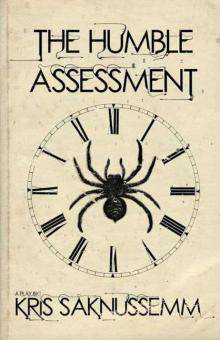 The Humble Assessment
The Humble Assessment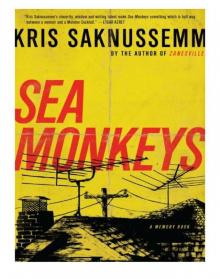 Sea Monkeys
Sea Monkeys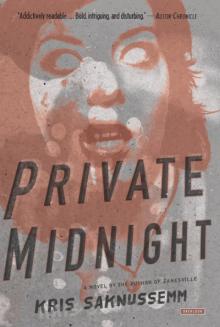 Private Midnight
Private Midnight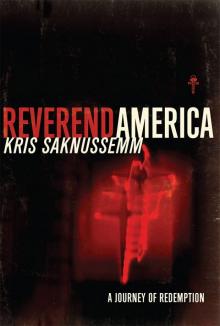 Reverend America: A Journey of Redemption
Reverend America: A Journey of Redemption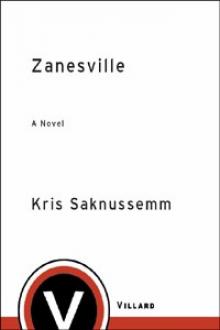 Zanesville: A Novel
Zanesville: A Novel